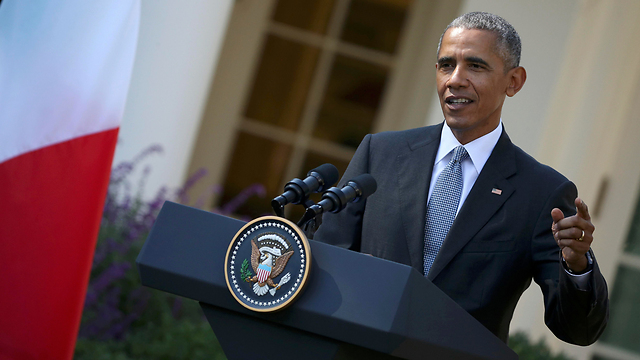Op-ed: Those who say the US president’s policy caused America to fall from grace are wrong. His cautious strategy actually weakened Russia and led to the elimination of key radical elements in the Middle East. It’s no wonder Putin supports Trump.
One of Donald Trump’s slogans in the current election campaign is that he will restore the United States’ central position in the world. Under his leadership, America will be great and strong again, like it used to be in the past. According to Trump, President Barack Obama is a weak leader who—with the help of his associate Hillary Clinton—led to a decline in America’s place in the world
In a recent coast to coast-to-coast trip in the US, and in my travels around the world, I heard many people support the criticism against Obama, even if they are not among Trump’s supporters. They point to the unprecedented increase in Russia’s defying activity, to the rise in global terror, to the collapse of the old order in the Middle East (and particularly the US attitude towards the situation in Egypt), to the rise of ISIS, etc. This opinion is shared by many in Israel too.

Can Obama’s policy in the past eight years really be linked to the abovementioned phenomena? Is it really a policy which weakened the US and caused it to fall from grace? If we take a look, for example, at the Russian activity, there is no doubt that Russia is defying the US and Europe in its actions in Ukraine. Sending its forces to Syria is not an insignificant matter either.
But what is the cause of all this? One of the main reasons is Russia’s growing economic weakness. Russia failed to rebuild its economy after the fall of the wall because it had a more convenient way of growing: Exporting oil and gas, especially to Europe. It fell into the same trap that the Arab states have been in for 100 years now: Pumping the money (oil) from the ground provides the illusion of imaginary economic prosperity and frees the public and the government from searching for other ways of developing. It’s no coincidence that the oil states are usually at the bottom of the United Nations list which measures the level of development in the world.
In the past few years, however, these countries have experienced a disaster: Oil prices have dropped by more than 50 percent compared to the situation five years ago, following the huge increase in production which was caused by American pressure (yes, Obama’s pressure) on Saudi Arabia and OPEC to pump more from the bowels of the earth. Saudi Arabia agreed, although it would be negatively affected, because of its dependence on the US and because the sharp drop in oil prices critically damaged the Iranian economy. In Iran, it prompted the government to sign the nuclear agreement, and in Russia it was reflected in moves aimed at signaling to the West (without going too far) that it is still a player which should be considered.
It was actually Obama’s policy which made Russia weaker and led to a rise in the “international fever.” This is similar to the difference between the cause of an illness and the temperature it creates. Acetaminophen can bring down your temperature, but can’t cure the actual illness. The weaker Russia becomes, the more eager it is to raise the international fever, and not the other way around.
Even when it comes to the Middle East, the situation is the opposite of what is usually perceived by the broad public. Obama refused to send his soldiers to a ground war on ISIS, and many believed that he was losing precious time in which the Islamic State organization would managed to create a strong basis in the Middle East. Instead, he stuck to a strategy of building a local power (mainly Iraqi and Kurdish). These days, it appears that he was right and that this strategy is succeeding. We see a direct lesson here from the mistake made by his predecessor, President George W. Bush, who did not settle for toppling Saddam Hussein but also dismantled the local military powers, thereby allowing the rise of ISIS.
Violent talk is not similar to leadership; deliberation and dialogue are not a sign of weakness. The illusion that the fever is the illness makes many people underestimate and misunderstand Obama’s policy—a policy which eventually weakened Russia and led to the elimination of key radical elements in our region. It’s no wonder that Russian President Vladimir Putin supports Trump.
As reported by Ynetnews
